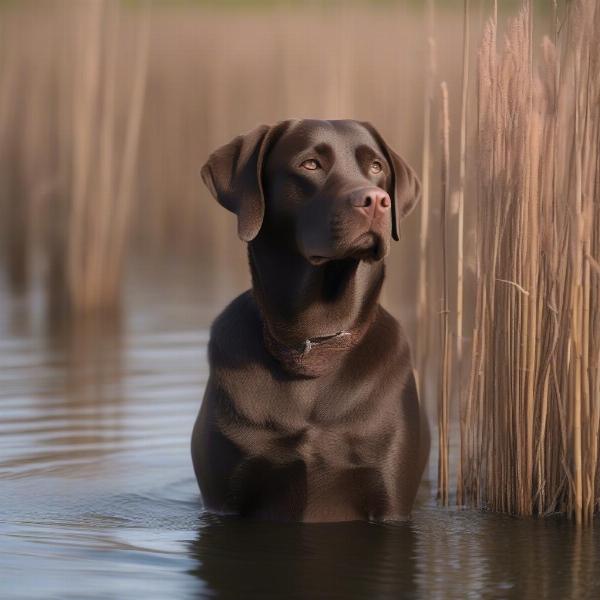Duck hunting is a thrilling sport, and having a reliable canine companion by your side can significantly enhance the experience. Good duck dogs possess a unique blend of intelligence, athleticism, and a deep-rooted instinct for retrieving waterfowl. This comprehensive guide delves into the world of good duck dogs, exploring suitable breeds, essential training techniques, and everything you need to know to foster a successful partnership with your feathered-friend-fetching partner.
Choosing the Right Breed: Top Duck Dog Contenders
Selecting the right breed is crucial for success in duck hunting. While several breeds excel in retrieving, certain traits make some stand out. Here’s a look at some popular and effective choices:
- Labrador Retrievers: Known for their intelligence, trainability, and gentle nature, Labs are arguably the most popular duck dog breed. Their thick coats provide insulation in cold water, and their strong retrieving drive makes them natural-born hunters.
- Golden Retrievers: Similar to Labs in temperament, Golden Retrievers are also excellent duck dogs. They possess a strong work ethic and are highly intelligent, making them eager to please and easy to train.
- Chesapeake Bay Retrievers: “Chessies” are known for their rugged build and exceptional cold-water tolerance. Their waterproof coat and powerful swimming ability make them ideal for challenging retrieves in harsh conditions.
- Nova Scotia Duck Tolling Retrievers: “Tollers” are smaller than Labs and Goldens but possess a unique hunting style. They lure waterfowl closer to shore with their playful antics, allowing hunters to take the shot.
 Labrador Retriever patiently waiting in a duck blind
Labrador Retriever patiently waiting in a duck blind
Essential Duck Dog Training Techniques
Training a good duck dog requires patience, consistency, and positive reinforcement. Here’s a breakdown of key training stages:
Basic Obedience: The Foundation for Success
Start with fundamental commands like “sit,” “stay,” “come,” and “heel.” This establishes a solid foundation for more advanced training.
Retrieving: Honing Natural Instincts
Introduce retrieving with bumpers or dummies. Gradually transition to actual ducks, ensuring the dog learns to handle them gently.
Water Introduction: Building Confidence
Introduce your dog to water gradually, starting with shallow water and progressing to deeper areas. Encourage confident swimming and retrieving in various water conditions.
Blind Retrieves: The Ultimate Test
Once your dog masters basic retrieving, introduce blind retrieves where the dog retrieves a fallen duck it hasn’t seen fall. This requires advanced obedience and reliance on your hand signals and whistles.
Duck Dog Gear and Supplies
Having the right gear enhances your dog’s performance and safety. Consider investing in:
- duck heads for dogs
- duck toys for dogs
- A well-fitting dog vest for visibility and warmth in cold water
- A durable dog leash and collar specifically designed for hunting
- A whistle for long-distance commands
- toy duck for dogs
- duck dog training supplies
Conclusion: Building a Strong Bond Through Hunting
Training a good duck dog is a rewarding journey that strengthens the bond between you and your canine companion. By following these guidelines, choosing the right breed, and investing time and effort into training, you’ll have a loyal and effective hunting partner for years to come. Remember to prioritize your dog’s well-being and safety throughout the process.
FAQ:
- What is the best age to start training a duck dog? Puppyhood is the ideal time to begin basic obedience training, but specialized duck hunting training can start around six months of age.
- How long does it take to train a duck dog? Training duration varies depending on the breed, individual dog’s aptitude, and the complexity of the desired skills. Expect to invest several months to a year for well-rounded training.
- Are all retrievers good duck dogs? While retrievers are generally well-suited for duck hunting, not all retrievers have the same drive or aptitude. Consider individual temperament and breed-specific traits.
- What are some common mistakes to avoid in duck dog training? Being inconsistent with commands, using harsh training methods, and neglecting socialization are common pitfalls.
- What is the importance of socialization for duck dogs? Socialization exposes the dog to various environments, sounds, and situations, helping them become well-adjusted and less likely to be startled or distracted during hunts.
- Can I train a duck dog myself, or should I hire a professional trainer? Both options are viable. Self-training requires dedication and research, while professional trainers offer expertise and structured programs.
- What are the health considerations for duck dogs? Duck dogs are prone to certain health issues like hip dysplasia, ear infections, and hypothyroidism. Regular veterinary checkups and preventative care are essential.
Related Articles:
ILM Dog is a leading online resource for dog owners and enthusiasts worldwide. We offer expert advice and practical tips on all aspects of dog care, from breed selection and health to training and nutrition. Our goal is to empower dog owners with the knowledge they need to provide the best possible care for their furry companions. Contact us today for personalized guidance and support. Email: [email protected], Phone: +44 20-3965-8624. Visit ILM Dog for more information on dog breeds, health, training, and more.